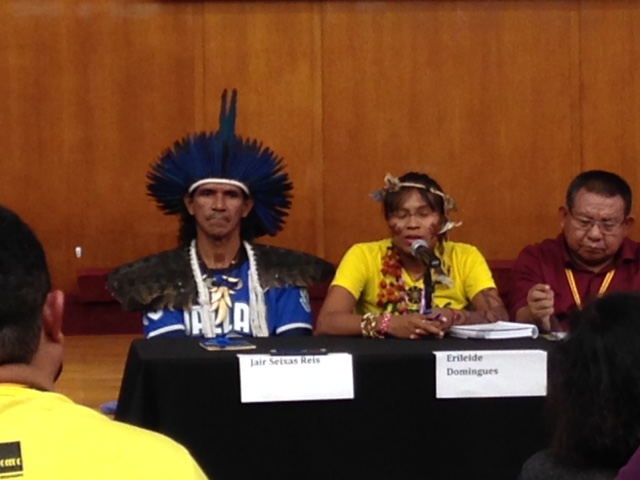By: Sr. Barbara Bozak
More than 1,000 indigenous individuals from around the globe gathered with government representatives, experts, and others, at the United Nations in New York, April 22 – May 3, 2019, for the 18th Session of the UN Permanent Forum on Indigenous Issues. Dressed in their traditional attire, these indigenous women and men shared both their wisdom and the difficulties they face on a daily basis.
During the meeting which was organized around the theme “Traditional knowledge: generation, transmission and protection,” one panel of experts addressed the topic of Indigenous Peoples and Climate Change. This issue is very important since the challenges faced by indigenous groups are magnified by climate change. They live close to the land and anything that negatively affects water, forests or animals has an impact on their traditional way of life.
The most moving testimony was given by the indigenous people themselves. Although the meeting brought indigenous people from every imaginable place, from small Pacific islands to the far north of Scandinavia, this time I heard the voices primarily of the indigenous of South and North America.
For those of South America, one of the greatest threats to their continued existence is the lack of land. While the people have deep ties to very specific territories, the government of Brazil, for example, has failed to demarcate the land that different groups are claiming. Not only this, but the government gives multi-national or other large corporations access to the resources even on land that has been demarcated. This, in effect, guarantees environmental pollution and ultimately destroys the land, the people, and their traditions. For the indigenous, land is life. All their traditional knowledge is rooted in their relationship to the land and the environment. Although the laws of Brazil, beginning with a royal decree of 1680, recognize the right of the indigenous to their land, the reality is that the government does not uphold its own laws. And the present government, led by Bolsinaro, is making the situation worse. There is hope that the Synod on the Amazon, which will take place in October of this year, will bring this and similar issues more to light.
In the North — as in South America — the existence of indigenous groups is threatened, though by other issues. In Canada, for example, many of the youth, especially the girls, are being kidnapped and trafficked or simply disappearing without the government intervening in a meaningful way. Grandmother Isabelle related how the native population of her tribe is working with others to combat trafficking and its consequences on her tribal territory. Their experience is that the government has destroyed their culture, their families, their ceremonies, in order to exploit the land, much as in South America. It is the grandmothers of the tribe who have formed the Grandmothers’ Council to hold the knowledge of the tribe, teach it to the younger generation, and begin the healing process so that life can grow.
There is no doubt that the traditional knowledge and wisdom of the indigenous peoples throughout the world can be an important resource in addressing the global crisis of climate change, but these peoples must be given the opportunity to thrive, which means given legal possession of their land.
[Sr. Barbara Bozak, a Sister of St. Joseph of Chambery- West Hartford, is the Congregations of St. Joseph NGO representative at the United Nations]

